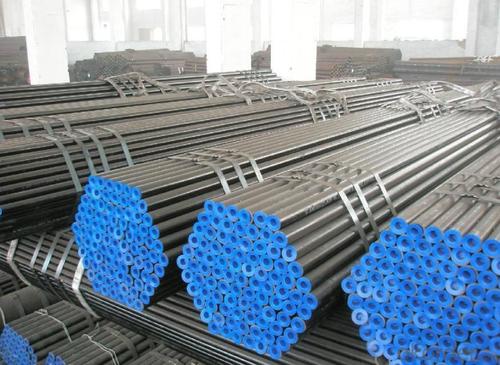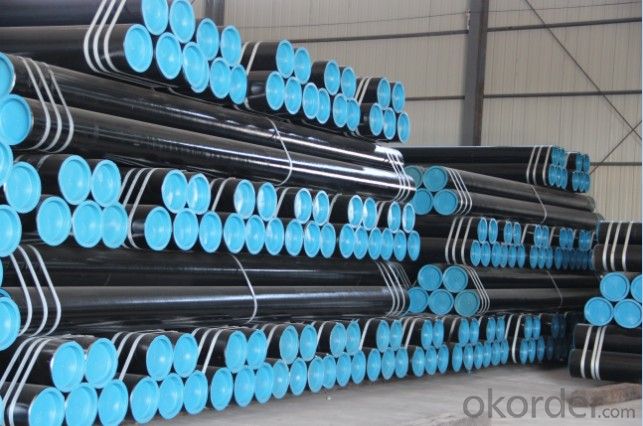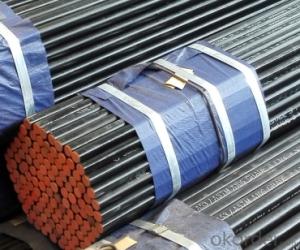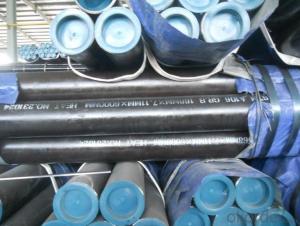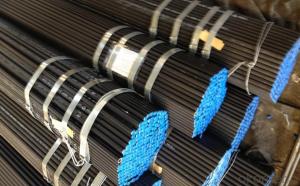Seamless Balck Pipe ASTM A106/API 5L/ASTM A53
- Loading Port:
- Tianjin
- Payment Terms:
- TT or LC
- Min Order Qty:
- 25 m.t.
- Supply Capability:
- 6000 m.t./month
OKorder Service Pledge
OKorder Financial Service
You Might Also Like
1、Structure of Seamless Balck Pipe ASTM A106/API 5L/ASTM A53:
Seamless pipe is formed by drawing a solid billet over a piercing rod to create the hollow shell. As the manufacturing process does not include any welding, seamless pipes are perceived to be stronger and more reliable. Historically seamless pipe was regarded as withstanding pressure better than other types, and was often more easily available than welded pipe.
2、Main Features of Seamless Balck Pipe ASTM A106/API 5L/ASTM A53:
• High manufacturing accuracy
• High strength
• Small inertia resistance
• Strong heat dissipation ability
• Good visual effect
• Reasonable price
3、Seamless Pipe ASTM A106/53 Specification:
Standard | GB, DIN, ASTM ASTM A106-2006, ASTM A53-2007 |
Grade | 10#-45#, 16Mn 10#, 20#, 45#, 16Mn |
Thickness | 8 - 33 mm |
Section Shape | Round |
Outer Diameter | 133 - 219 mm |
Place of Origin | Shandong, China (Mainland) |
Secondary Or Not | Non-secondary |
Application | Hydraulic Pipe |
Technique | Cold Drawn |
Certification | API |
Surface Treatment | factory state or painted black |
Special Pipe | API Pipe |
Alloy Or Not | Non-alloy |
Length | 5-12M |
Outer Diameter | 21.3-610mm |
Grade | 20#, 45#, Q345, API J55, API K55, API L80, API N80, API P110, A53B |
Standard | ASME, ASTM |
1) Material:20#(ASTM A 106/A53 GRB.API5LGRB,GB),45#,16Mn,10#.
2) Specification range:OD:21.3-610mm,WT:6-70mm,length:6-12m or according to the requirement of clients.
3) Excutive standards:GB,ASME API5L.ASTM A 106/A53,Despite of the above standards,we can also supply seamless steel pipe with standard of DIN,JIS,and so on,and also develop new products according to the requirements of our clients!
4) Surface:black lacquered,varnish coating or galvanized.
5) Ends:Beveled or square cut,plastic capped,painted.
6) Packing:bundles wrapped with strong steel strip,seaworthy packing.
4、Packaging & Delivery
Packaging Details: | seaworthy package,bundles wrapped with strong steel strip |
Delivery Detail: | 15-30days after received 30%TT |
5、FAQ of Seamless Balck Pipe ASTM A106/API 5L/ASTM A53:
①How is the quality of your products?
Our products are manufactured strictly according to national and internaional standard, and we take a test
on every pipe before delivered out. If you want see our quality certifications and all kinds of testing report, please just ask us for it.
Guaranteed: If products’ quality don’t accord to discription as we give or the promise before you place order, we promise 100% refund.
②How about price?
Yes, we are factory and be able to give you lowest price below market one, and we have a policy that “ for saving time and absolutely honest business attitude, we quote as lowest as possible for any customer, and discount can be given according to quantity”,if you like bargain and factory price is not low enough as you think, just don’t waste your time.Please trust the quotation we would give you, it is professional one.
③Why should you chose us?
Chose happens because of quality, then price, We can give you both.Additionally, we can also offer professional products inquiry, products knowledge train(for agents), smooth goods delivery, exellent customer solution proposals.Our service formula: good quality+good price+good service=customer’s trust
SGS test is available, customer inspection before shipping is welcome, third party inspection is no problem.
6、Seamless Pipe ASTM A106/53 Images:
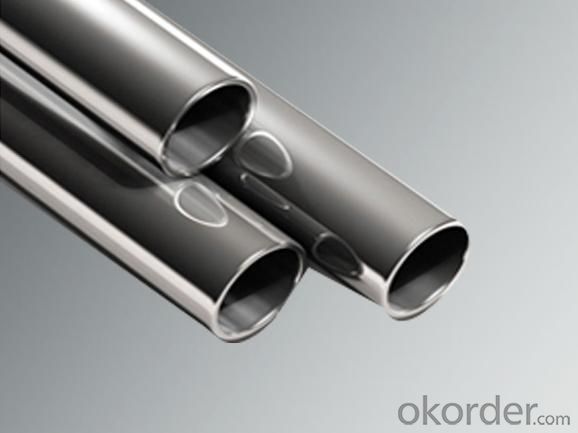
- Q: How do steel pipes compare to other materials, such as PVC or copper?
- Steel pipes have several advantages over other materials such as PVC or copper. Firstly, steel pipes are incredibly durable and strong, making them suitable for heavy-duty applications and high-pressure environments. Additionally, steel pipes have a longer lifespan compared to PVC or copper, as they are less prone to cracking, corrosion, or degradation. Steel pipes also provide better fire resistance and are more resistant to extreme temperatures. However, steel pipes can be more expensive and require professional installation due to their weight and rigidity. PVC pipes, on the other hand, are lightweight, affordable, and easy to install, but they may not be as durable or suitable for certain applications. Copper pipes offer excellent corrosion resistance and are commonly used for water supply systems, but they can be more expensive and require skilled labor to install. Ultimately, the choice between steel, PVC, or copper pipes depends on the specific requirements of the project and the desired balance of cost, durability, and performance.
- Q: Are steel pipes resistant to ultraviolet (UV) radiation?
- Steel pipes are not inherently resistant to ultraviolet (UV) radiation. UV radiation can cause degradation and discoloration of certain materials, including steel. However, the extent of the damage depends on various factors such as the type of steel, the duration and intensity of exposure to UV radiation, and the presence of protective coatings or finishes on the steel pipes. In general, uncoated steel pipes are more susceptible to UV radiation damage compared to pipes that have been treated with protective coatings or finishes. These coatings, such as epoxy or polyethylene, provide a barrier against UV radiation and help to prevent the degradation and discoloration of the steel. Therefore, it is important to consider the specific application and environment when choosing steel pipes and implementing appropriate protective measures to ensure their longevity and performance.
- Q: How are steel pipes used in the construction of industrial facilities?
- Steel pipes are commonly used in the construction of industrial facilities for various purposes such as transporting fluids, gases, and steam, as well as providing structural support and carrying electrical wiring. They are durable, resistant to corrosion, and can withstand high pressure and temperature, making them ideal for industrial settings.
- Q: What are the factors to consider when selecting pipe materials for high-temperature applications?
- When choosing pipe materials for high-temperature applications, several factors must be taken into account. First and foremost, the thermal conductivity of the material is crucial. Efficient heat transfer and prevention of heat buildup are necessary in high-temperature applications, therefore materials with high thermal conductivity, like copper and stainless steel, are commonly used in these installations. Secondly, it is important to consider the material's resistance to thermal expansion. Pipes tend to expand when exposed to high temperatures, so selecting materials with low thermal expansion coefficients is vital to avoid deformation and potential pipe failure. Carbon steel and stainless steel are suitable options as they exhibit relatively low thermal expansion. The material's mechanical strength and resistance to corrosion should also be considered. High temperatures can weaken or corrode certain materials, leading to structural failures. Therefore, it is essential to choose materials, such as alloy steel and nickel-based alloys, that can withstand high temperatures without compromising their mechanical strength or corroding easily. Additionally, the cost and availability of the materials should be taken into account. Some high-temperature pipe materials may be expensive or hard to obtain, which can impact the project's budget and timeline. It is important to find a balance between the desired material properties and the project's financial and logistical constraints. Lastly, it is crucial to consider the specific application requirements and industry standards. Different industries may have guidelines or regulations regarding pipe materials for high-temperature applications. Ensuring that the selected materials comply with these standards is essential for safety, reliability, and adherence to industry regulations. To conclude, the factors to consider when choosing pipe materials for high-temperature applications include thermal conductivity, resistance to thermal expansion, mechanical strength, resistance to corrosion, cost and availability, and compliance with industry standards. By carefully evaluating these factors, one can select the most suitable pipe material to ensure efficient and reliable operation in high-temperature environments.
- Q: Can steel pipes be used for underground sewage systems?
- Yes, steel pipes can be used for underground sewage systems. Steel pipes are known for their durability and strength, making them suitable for underground applications. However, it is essential to ensure that the steel pipes are properly coated or protected against corrosion to prevent damage from sewage and soil conditions.
- Q: What steel pipes are buried for outdoor heating pipes? Seamless or welded tube? Are there any rules for specific countries? Can use the seamed tube?
- Where outdoor heating pipes are buried, what steel pipe shall be referenced by the 11.1.2 code for installation of outdoor piping?:This chapter applies to the quality inspection and acceptance of the outdoor heating pipe network installation of the plant and the civil building group (residential area) with the saturation steam pressure not greater than 0.7MPa, and the hot water temperature not exceeding 130 degrees celsius.
- Q: What are the applications of galvanized steel pipes?
- Galvanized steel pipes have a wide range of applications across various industries. They are commonly used in plumbing systems for water supply and drainage systems due to their corrosion resistance and durability. Additionally, they are used in the construction industry for structural supports, scaffolding, and fencing. Galvanized steel pipes are also widely utilized in agricultural irrigation systems and in the transportation of liquids and gases.
- Q: What are the factors affecting the durability of steel pipes?
- There are several factors that can affect the durability of steel pipes, including the quality of the steel used, the manufacturing process, the environment in which the pipes are installed, and the maintenance and care given to the pipes.
- Q: How do steel pipes differ from other types of pipes?
- Steel pipes possess several distinct characteristics that set them apart from other pipe types. Primarily, their strength and durability are well-known. They exhibit remarkable resistance to heat, pressure, and corrosion, rendering them suitable for numerous applications. Additionally, their robustness allows them to bear heavy loads and offer an extended service life. One distinguishing feature of steel pipes lies in their versatility. They can be manufactured in various shapes and sizes to fulfill specific project requirements. This adaptability has contributed to their popularity across a diverse range of industries, including construction, oil and gas, water treatment, and manufacturing. Moreover, steel pipes exhibit exceptional thermal conductivity, facilitating efficient heat transfer between different areas. Consequently, they prove suitable for applications involving heating and cooling systems, as well as the transportation of hot fluids or gases. Furthermore, steel pipes are renowned for their resistance to fire. They possess a high melting point and are not easily ignited or conducive to the spread of flames. This characteristic is particularly critical in applications where fire safety is a concern, such as buildings or industrial facilities. Lastly, although steel pipes may entail a higher initial cost compared to other pipe types, their long-term benefits, such as durability and low maintenance requirements, often outweigh the initial investment. Additionally, steel pipes are highly recyclable, making them an environmentally friendly choice. In summary, steel pipes stand out due to their strength, durability, versatility, excellent thermal conductivity, fire resistance, and recyclability. These remarkable qualities establish steel pipes as the preferred option for a wide range of applications across various industries.
- Q: How are steel pipes used in heating systems?
- Steel pipes are commonly used in heating systems to transport hot water or steam from the boiler to the radiators or heating units. The durability and strength of steel make it an ideal choice for withstanding high temperatures and pressure. These pipes are typically installed underground or within the walls and floors of buildings to distribute heat efficiently throughout the space.
Send your message to us
Seamless Balck Pipe ASTM A106/API 5L/ASTM A53
- Loading Port:
- Tianjin
- Payment Terms:
- TT or LC
- Min Order Qty:
- 25 m.t.
- Supply Capability:
- 6000 m.t./month
OKorder Service Pledge
OKorder Financial Service
Similar products
Hot products
Hot Searches
Related keywords


